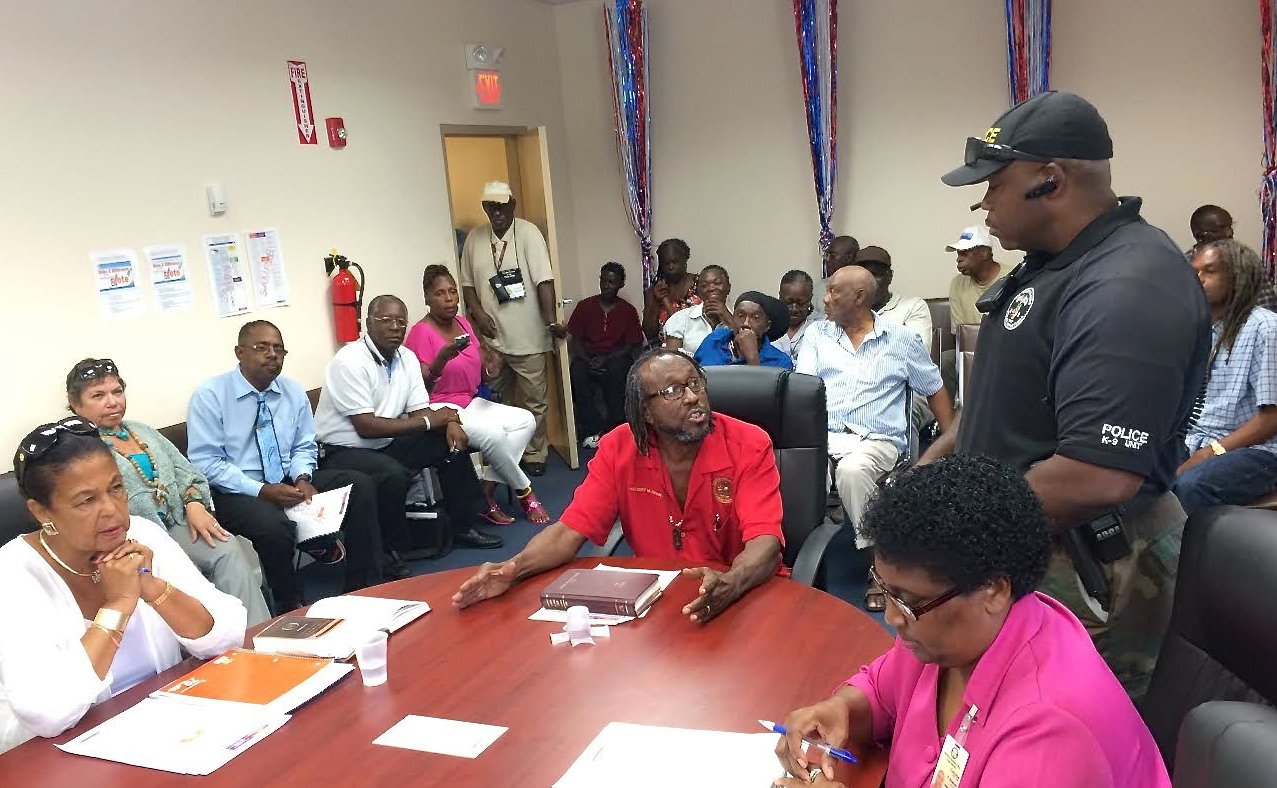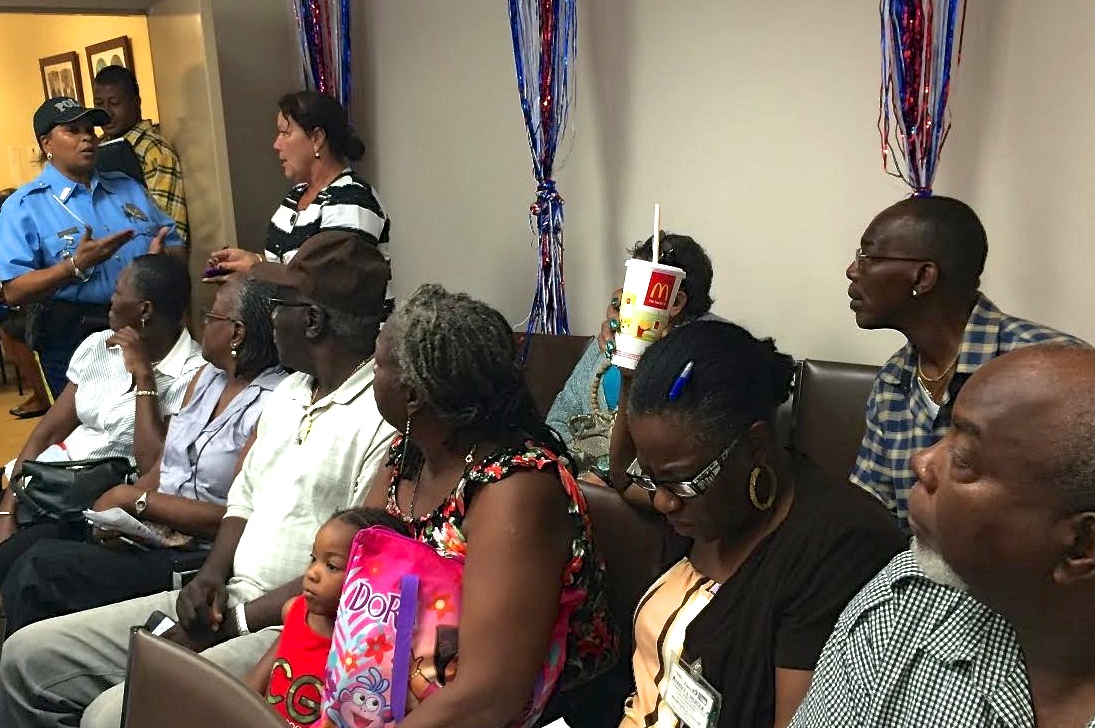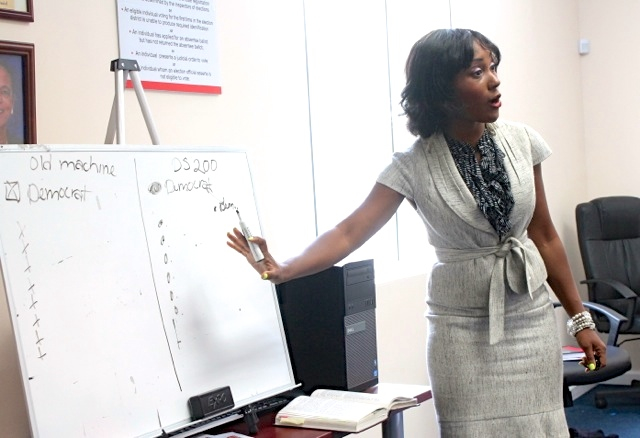
Board members voted to go into executive session after Election Territorial Coordinator Tonjia Coverdale said the machines were programmed the way they were supposed to be and urged the board “on behalf of the people of the Virgin Islands” to reconsider allowing voters to use the DS200s, the tabulating machines that record the votes in the paper ballots.
Problems with the DS200s came to light a few days before the start of early voting on Oct. 21. As a result, the board decided not to use the tabulating machines. The voters would still fill in their paper ballots, but instead of feeding them into the machines to be counted, the ballots are dropped in a sealed bin, to be fed into the machines later by the board members.
Board member Arturo Watlington said Coverdale’s recommendation to use the machines was out of order.
According to Joint Board Chairwoman Alecia Wells, the board voted to go into executive session to discuss Coverdale’s presentation, which did not match a prior report Coverdale submitted.
Voting in favor of the executive session were Wells, Watlington, Lisa Harris-Moorhead, Glen Webster, Lydia Hendricks, Raymond Williams and Claudette Georges. Voting against the executive session were Adelbert Bryan, Liliana Belardo de O’neal, Wilma Marsh-Monsanto, Roland Moolenar and Rupert Ross.
“We were at loss as to where we’re going from here,” said Wells.
The public, however, did not go anywhere for a good hour after they were asked to leave.
“What struck me was the fact that their own expert explained there was nothing wrong, as they were pretending, with the machines, that the machines were working perfectly well,” said St. Thomas resident Eddie Donohue, adding that under the Revised Organic Act, discussing the coordinator’s report was not enough reason to go into executive session.
Board counsel Kimberly Salisbury, however, disagreed. “If it has legal ramifications, and that’s what they want to discuss, then yes,” she said. “It is an emergency.”
“It is unusual. I’ll grant that, but if it is to discuss legal ramifications, they can basically allow it,” she said.

The issues with the DS200s surround the straight-party voting option introduced in the general election ballot. In the new ballots, voters can select a party symbol to vote straight for that party. The problem arises when a voter selects a party symbol, then picks other candidates outside of that political party.
Coverdale, however, insists that the current programming is how it is supposed to be done. Using the Democratic Party to illustrate, Coverdale said if a voter picked the Democrat symbol, and then voted for a Republican delegate to Congress, the DS200 would choose the Republican candidate vote for delegate to Congress and retain the Democratic Party votes in all the other categories.
“This is supporting a voter’s right to vote the split ticket,” said Coverdale.
According to Coverdale, the Election System received a statement from ES&S, the machine vendor, saying 14 other states are using the same programming, and that this has been confirmed by the Election Assistance Commission.
“I do not see how the EAC, who is the federal body, would certify a machine that wouldn’t work in every jurisdiction that it covers,” said Coverdale.
Salisbury, however, pointed out that the current programming poses a problem if, for example, a voter selected the Democratic Party symbol then selects an independent senatorial candidate. In this case, Salisbury said the independent senator’s vote would be recorded, but the votes for all seven of the Democratic senators would be voided.
“If the machine works that way,” Salisbury said, referring to Coverdale’s description of the programming,” which Democrat would it take away? There’s no way for the machine to know which, because now, you’ve got eight. So instead it deletes them all.”
In a later test run where a voter selected the party symbol and over-voted for other candidates outside the party, the DS200 voided the party candidates in the categories where candidates outside of the party were also selected, proving Salisbury’s point. Instead of kicking out the ballot, the DS200 accepted it without informing the voter that votes were deleted.
“The voter has no idea that they’ve potentially made a mistake,” said Salisbury. “[The DS200] is assuming they’ve changed their mind.”
Without use of the machines, however, voters lose the opportunity to recast their votes if their ballots are eventually found spoiled by the DS200.
“That’s why it’s been a very difficult decision for the board to decide what to do,” said Salisbury.
St. Thomas resident Agrey George said he does not agree with allowing someone else to place his completed ballot in the machine.
“That’s against the law,” he said. “I’m afraid they’re going to steal the election. they might discard some of the ballots or replace some of the ballots the way they want it to be marked up.”
The board came out of executive session in less than two hours and proceeded to demonstrate to the public different scenarios where they said the DS200 did not perform accurately or as the voter intended.
“As long as we can show you one inaccuracy, that’s all we have to prove,” said Watlington.
The board’s decision not to let voters use the DS200 still stand, according to Watlington. The board did not make progress on any other agenda item.






